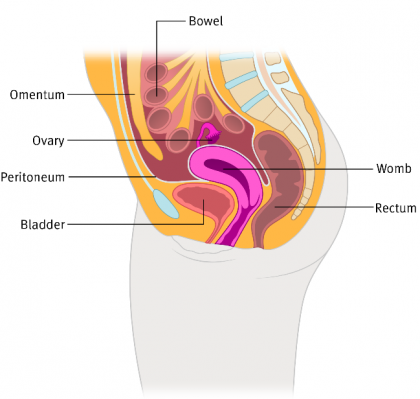The peritoneum is a large, thin, flexible sheet of tissue that covers the organs inside your abdomen (tummy) including your bowels, stomach, liver and reproductive organs.
It may be helpful to think of the peritoneum like a type of 'cling film'. It has a number of jobs including protecting your organs and keeping them securely in place. It also produces a fluid which covers your organs making them slick and smooth. This stops them from sticking to each other and allows them to move smoothly when you’re active.
Primary peritoneal cancer is a type of cancer that starts growing in the peritoneum. It can start in any part of the peritoneum, and sometimes in more than one place. But usually it starts in the area that covers the organs low down in your pelvis (the lower part of the tummy between your hip bones). Cancers that start in the peritoneum can sometimes spread to other organs in the tummy, which may include the ovaries.

Why am I being treated by gynae-oncology?
Primary peritoneal cancer is very similar to epithelial ovarian cancer. Both types of cancer:
- can cause similar symptoms, in particular ascites – a large build-up of fluid in the tummy
- are treated in the same way
- appear identical when looked at under a microscope.
Health professionals experienced in treating those with gynaecological cancers will treat you. This is because the treatments for ovarian cancer and primary peritoneal cancer are very similar. Surgery for primary peritoneal cancer can also involve removing the reproductive organs.
Who will be looking after me?
After your diagnosis you should be told who the main person looking after your care is. This person is usually known as your key worker and is often a clinical nurse specialist (CNS).
Your CNS will support you during and after your treatment. You can contact them for support and advice on any aspect of your treatment and recovery.
What treatment will I have?
The treatments for PPC and ovarian cancer are similar, including chemotherapy and surgery.
How you might feel?
Being told that you have cancer can be a shock, even if you were expecting your diagnosis. It's very normal to experience many different emotions throughout your diagnosis, treatment and beyond.
If you’re diagnosed with primary peritoneal cancer you might experience emotions and feelings associated with this cancer type. Some of the women we spoke to said that they feel invisible because "no one has heard of primary peritoneal cancer". If you feel this way you aren’t alone.
"I feel invisible"
You will be looked after by a gynae-oncology team and treated like you have ovarian cancer. You may have been offered the same information as those diagnosed with ovarian cancer. Yet you will have been told that you have a cancer with a different name. You may feel that nobody acknowledges that the cancer type you have is different.
"No one has heard of primary peritoneal cancer"
Many people find it very difficult to tell their close family and friends that they have been diagnosed with cancer. Being diagnosed with primary peritoneal cancer can bring with it extra challenges. Friends and family might not have heard of this type of cancer. This can make you feel very alone with your diagnosis.
"I don’t understand my diagnosis"
After reading this information you may find that you still have questions or even new concerns. Your CNS, surgeon or oncologist will be happy to explain your diagnosis in as much detail as you need. Don't be afraid to ask them to explain things again. It can be very difficult to absorb all the information they give you the first time.
It may help to:
- Join our online community to speak to others and get advice and support
- Call our support line to speak to a specialist nurse about how you’re feeling or to have your questions about primary peritoneal cancer answered
- Sign up to our regular support events or watch past events back
- Find a support group local to you
Your clinical nurse specialist (CNS) may also be able to put you in touch with others locally. Most hospitals will also have links with a local cancer support centre, such as Maggie's or Macmillan, which might offer a range of mental health support for free.
Last reviewed: May 2022
To learn more about our review process, take a look at our information standards.


